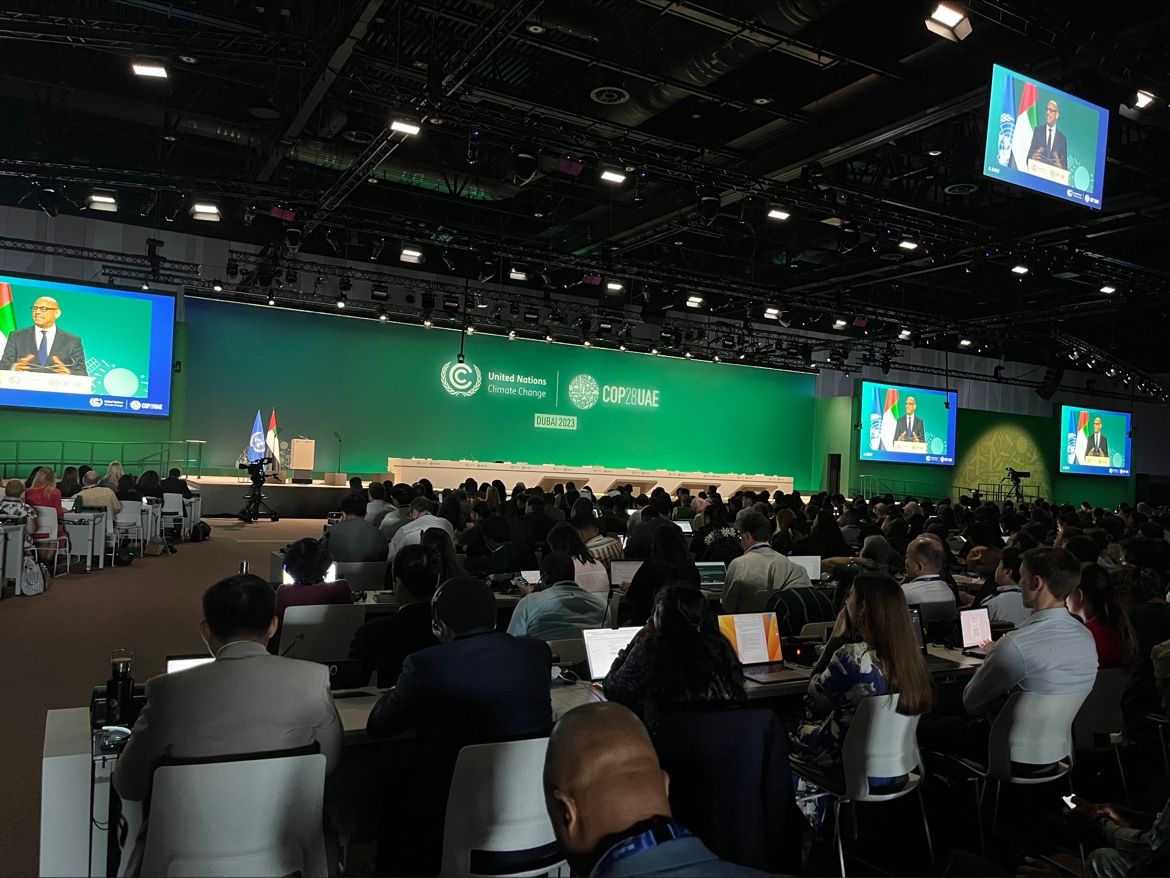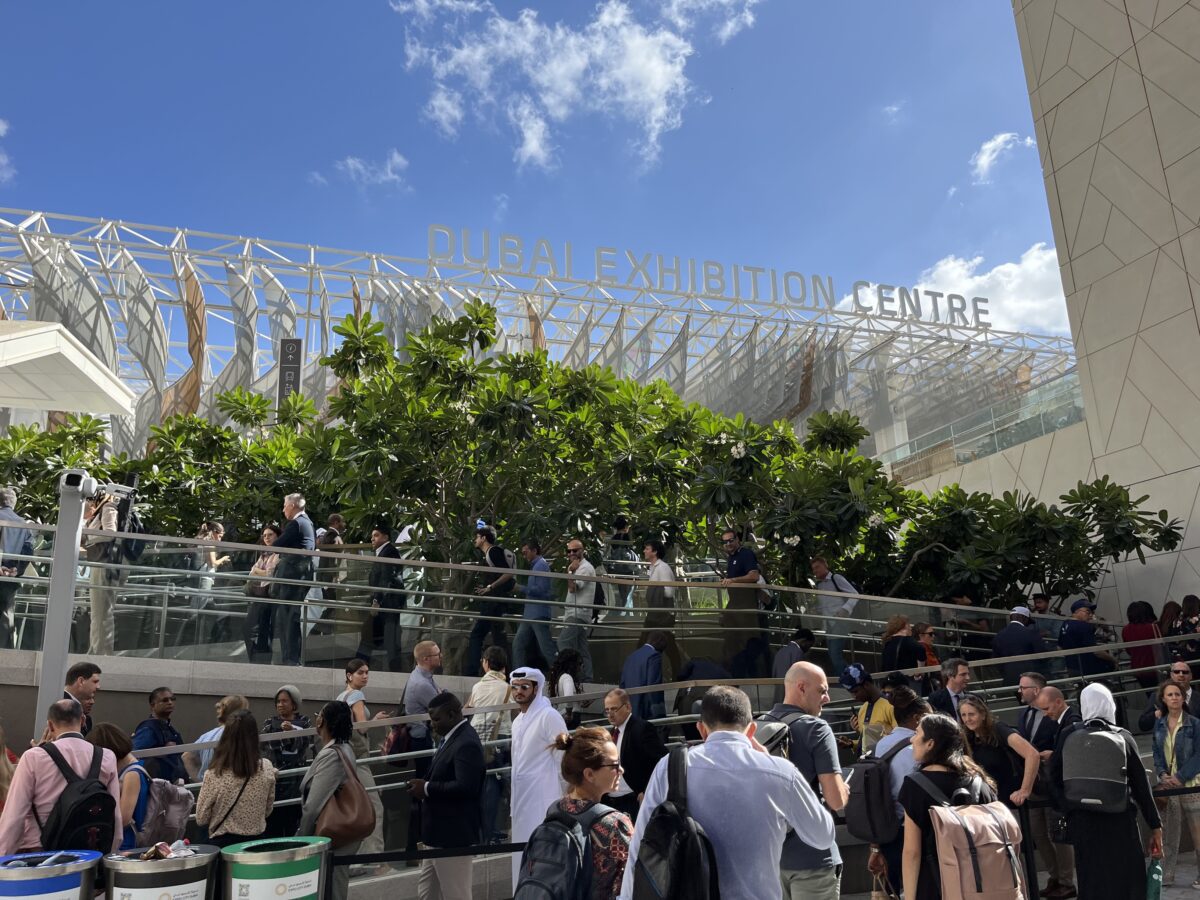Live from Dubai
Throughout the two-week negotiations, CMI’s Janet Hallows & Kurt Winter discussed key topics of interest with experts on the ground. Watch these short interviews below.

In line with CMI’s 2025 Strategic Plan, a key focus of CMI’s work is to support policy and regulatory frameworks aligned with the UNFCCC Paris Agreement goals. CMI’s direct engagement in the UNFCCC and international voluntary initiatives supports its broader work programme in building investable, high-integrity domestic frameworks, as well as carbon markets in the Asia-Pacific region that ensure enduring social and environmental benefits for local communities.
CMI has been an official observer organisation at COP since 2015, taking a delegation of Corporate Members to the conference each year. Passes are made available to Corporate Members through an EOI process, and individuals chosen represent organisations from across the carbon value chain.
Throughout the two week conference, CMI’s COP28 Hub will track engagement with key themes and updates as they emerge, while also providing details on CMI-hosted events and side-events attended by CMI’s delegation on-the-ground in Dubai.
Throughout the two-week negotiations, CMI’s Janet Hallows & Kurt Winter discussed key topics of interest with experts on the ground. Watch these short interviews below.
Below are CMI’s key priorities for the negotiations at COP28.
For a more detailed overview of our key asks from both an international and domestic point of view, access our CMI COP28 Priorities & Calls to Action paper below.
The first global stocktake (GST) should be a ‘global accelerator’ that recalibrates transformative action to towards Paris goals. The Synthesis GST Report assessment of collective progress towards Paris Agreement temperature goal of well below 2C and pursuit of 1.5C notes the Agreement has driven climate action but that “much more is needed”.
To date, only a handful of countries have submitted enhanced Nationally Determined Contributions (NDCs). In submitting higher ambition NDCs, Parties must outline mitigation efforts and related supporting finance deployment alongside adaptation efforts.
A course correction roadmap of political outputs arising from the GST technical analysis should inform ratcheting of collective and transformative ambition and be incorporated into Parties’ current 2030 and 2035 NDCs due to be submitted in early 2025 for consideration in Brazil at end of 2025 at COP30.
Whilst the Article 6 rulebook for global cooperation with international markets (Articles 6.2 & 6.4) and non-market (6.8) approaches was broadly agreed at COP26, COP28 is a critical opportunity to allow full and swift operationalisation to enable further climate finance. Research has highlighted that effective use of Article 6 and trade in Internationally Transferable Mitigation Outcomes (ITMOs) can deliver an additional 4 to 12 billion tonnes of emissions reductions annually by 2030.[1]
There has been a surge of Article 6.2 bilateral cooperation agreements, including in the Asia Pacific region -with Japan, South Korea and Singapore actively seeking partnerships and formalising Memorandums of Understanding to secure international credits required to meet domestic NDC targets.
However, market readiness for governments, private sector, community and practitioners needs urgent attention to ensure integrity, and to assure assistance for NDC and sustainable development goals are maximised. These should be well resourced to safeguard the rights of the Indigenous and local communities in small island and other developing states that may host these projects.
[1] UNEP (2021), Emissions Gap Report 2021, p.59; James Edmonds et al. (2021), How Much Could Article 6 Enhance Nationally Determined Contribution Ambition Toward Paris Agreement Goals Through Economic Efficiency? Climate Change Economics 12(2); Taskforce on Scaling Voluntary Carbon Markets: Final Report, p.50.
The private sector has an important role to play in supporting the global transition to a net zero economy, and this role is increasingly being recognised through the UNFCCC approach.
COP28 will see further development of the UNFCCC Secretariat’s Recognition and Accountability Framework for non-Party stakeholder climate action, as well as the launch of the COP Presidency’s Net-Zero Transition Charter. Both pieces of work provide an important intersection between public and private sector contributions, which must be fleshed out to increase financial flows into high-integrity climate solutions. The COP Presidency has made an unprecedented call out to voluntary carbon market (VCM) carbon crediting standards to “align on integrity” and their role in net zero transition must be recognised and standardised.
Climate finance is a central agenda item of discussion at COP28, with current financing falling well short of the trillions required to meet Paris goals.
A new collective quantified goal on climate finance (NCQG) needs to be agreed next year at COP29 but substantial progress should be made at COP28.
The COP Presidency has signalled to Parties a focus on a paradigm shift on finance – by delivering on old promises and setting the framework for a new deal on finance. Discussions should cover transformational climate finance innovation (risk-sharing, blended finance), building institutional capacity in developing countries, multilateral bank reform (specifically the Bretton Woods reform agenda including changes to World Bank and IMF governance and priorities) and accountability mechanisms for countries and companies.
Delivering and operationalising the global Loss and Damage fund established at COP27 will also be key with global consensus required on definitions, collaboration and innovative financing.
Other key decisions at COP28 include a global goal on adaptation, as well as further priorities for nature-based solutions and alignment with the Convention on Biological Diversity’s 2023 Kunming-Montreal Global Biodiversity Framework.
Australia’s Assistant Minister for Climate Change and Energy, Jenny McAlister is co-chairing work on the Global Goal on Adaptation.
On Just Transition, COP27 saw agreement on the establishment of a work programme and at a subsequent multilateral consultation convened by the COP28 Presidency, Parties called for a solutions-focused work program that promotes on guidance on just transition.
Throughout the two-week negotiations, CMI participated in a number of side events at Blue Zone Pavilions. Watch recordings of these events below.

